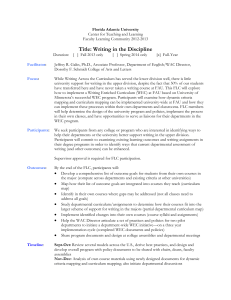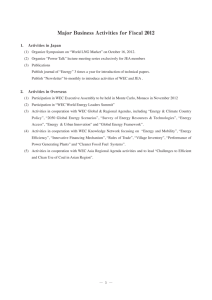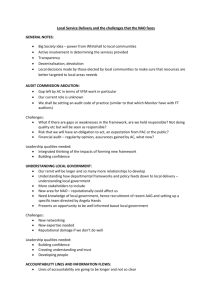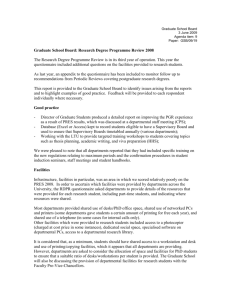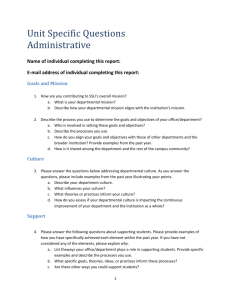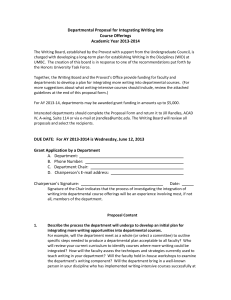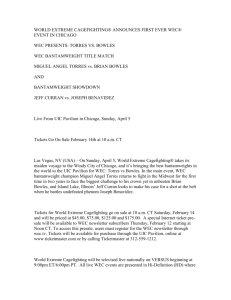April 26th
advertisement
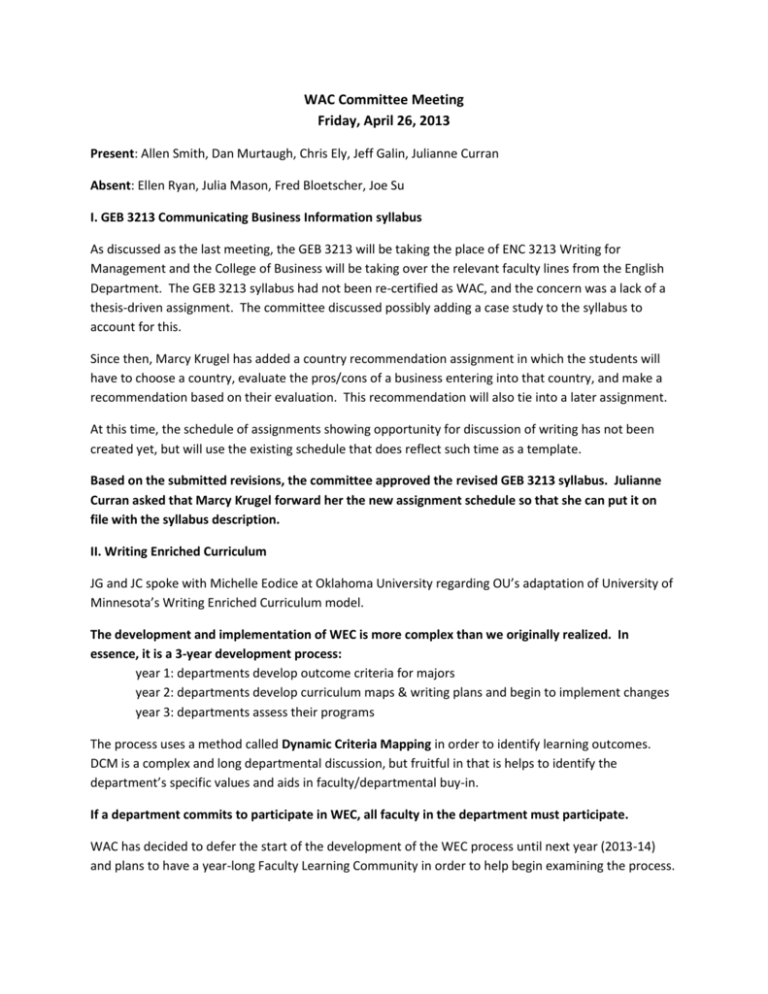
WAC Committee Meeting Friday, April 26, 2013 Present: Allen Smith, Dan Murtaugh, Chris Ely, Jeff Galin, Julianne Curran Absent: Ellen Ryan, Julia Mason, Fred Bloetscher, Joe Su I. GEB 3213 Communicating Business Information syllabus As discussed as the last meeting, the GEB 3213 will be taking the place of ENC 3213 Writing for Management and the College of Business will be taking over the relevant faculty lines from the English Department. The GEB 3213 syllabus had not been re-certified as WAC, and the concern was a lack of a thesis-driven assignment. The committee discussed possibly adding a case study to the syllabus to account for this. Since then, Marcy Krugel has added a country recommendation assignment in which the students will have to choose a country, evaluate the pros/cons of a business entering into that country, and make a recommendation based on their evaluation. This recommendation will also tie into a later assignment. At this time, the schedule of assignments showing opportunity for discussion of writing has not been created yet, but will use the existing schedule that does reflect such time as a template. Based on the submitted revisions, the committee approved the revised GEB 3213 syllabus. Julianne Curran asked that Marcy Krugel forward her the new assignment schedule so that she can put it on file with the syllabus description. II. Writing Enriched Curriculum JG and JC spoke with Michelle Eodice at Oklahoma University regarding OU’s adaptation of University of Minnesota’s Writing Enriched Curriculum model. The development and implementation of WEC is more complex than we originally realized. In essence, it is a 3-year development process: year 1: departments develop outcome criteria for majors year 2: departments develop curriculum maps & writing plans and begin to implement changes year 3: departments assess their programs The process uses a method called Dynamic Criteria Mapping in order to identify learning outcomes. DCM is a complex and long departmental discussion, but fruitful in that is helps to identify the department’s specific values and aids in faculty/departmental buy-in. If a department commits to participate in WEC, all faculty in the department must participate. WAC has decided to defer the start of the development of the WEC process until next year (2013-14) and plans to have a year-long Faculty Learning Community in order to help begin examining the process. Goals of the FLC: Get a clear idea of the program Identify any finer details of the WEC program or process that we have not thought of Pilot criteria/assessment discussion and start looking at a department’s curriculum Identify complications and/or implications that would help prepare us for full departmental meetings/conversations Develop documents for the process and “test” them and/or adapt them Get faculty members interested; potentially solicit members for WEC committee (a separate entity of WAC; a sub-committee of WAC, a joint WAC/WEC committee…TBD) Serve as a starting point to get more university buy-in. The committee members present felt that the WEC initiative is feasible because departments have shown interest; it gives departments control of their own processes and will help provide assessment tools that the departments can later draw on for the university. It is also an opportunity to expand the existing WAC program which seems to have reached its saturation point. Support/Resources for faculty WAC has approximately $20,000 that can be used as seed money; it would need to be determined what kind of support would be offered by the university. The necessity of university administration buyin/support is another reason that it is better to wait to begin the initiative. Faculty in the year-long FLC would get a $1000 stipend WAC has 11 “summer training” stipends of $1400 each The 2 WAC departmental grants of $2000 each can be turned into WEC supplements Year 1 WAC would potentially be able to offer ~$5000 to two departments Year 2 is complicated to determine at this time because there would be additional departments starting the process, unless the university was willing to match the support the WAC has to offer. It would be very useful for a graduate student to work for each college (who would be paid for by each college). However, the Graduate College may be reducing the number of Graduate Assistantships that are available, and graduate students might be limited in that graduate assistantships that are available and are taken on by students must serve their degrees/be in their line of study. A question that WAC committee needs to consider is what would be a reasonable monetary compensation for a WEC departmental liaison? Some possibilities for liaison incentives might be to give them the options of: A stipend A course release Funds toward research support The committee members present felt it would be wise to compensate departmental WEC liaisons well. The liaisons need to feel that they have a responsibility to fulfill their duties based on the compensation they earn for the position. The departmental liaisons will be key in developing interest and momentum from its department’s faculty. At this time, we anticipate the tasks/responsibilities of the WEC liaison would be: Set up departmental meetings in which the department’s faculty will discuss values, identify outcome goals, think about curriculum, etc. There would probably be about four departmental meetings for the WEC process over the course of the year. JG and JC will participate in these meetings as facilitators. Draft the language for departmental outcome / learning criteria that emerges from the series of departmental conversations. (Potentially these meetings would be recorded and relevant portions would be transcribed for this purpose) Coordinate the development of the department’s curriculum map – help to complete it, revise it, and re-visit it. Submit the department’s Writing Proposal, which will: o Explain what the outcomes are and why they are valued o Identify the courses that satisfy the outcome criteria o Describe the department’s assessment process o (Include any supplementary or additional documents that the department wishes to include) The faculty who participate in the FLC can help orient those who become liaisons; existing liaisons would help orient new liaisons from other departments A department’s WEC liaison might be the faculty member who participated in the FLC, but it does not have to be. Department’s development process outline: Year 1: Identify criteria – begin curriculum map Year 2: Continue to develop/Revise curriculum map – submit Writing Proposal Year 3: Assess – ideally departments will run their assessment processes themselves FAU’s TASL (Assessment committee) is eventually moving toward having departments create curriculum maps to help identify assessment goals. When departments realize that WEC will help them to reach university assessment goals, they may become more interested in participating in the process. Some obstacles that the committee anticipates in developing the WEC process include: Faculty perceiving that the university is imposing more requirements across the board to departments Faculty that do not see the value/purpose of the initiative, or do not see taking on the initiative as something that is directly related to their individual teaching/research/field of study Coordinating faculty who are based on other campuses to be involved in the department’s conversations and development of Writing Plan. In terms of faculty that may be hesitant or do not want to commit to the process, the incentive is that if they want to have a voice in the curricular decisions that the department makes, then they need to participate in the departmental meetings/conversations. In the end, the commitment for departmental meetings would be four meetings over the course of the year. The director of the University of Minnesota’s WEC program, Pamela Flash, advised that the departmental meetings are an essential part of the process and caution must be taken so as to not undermine the whole process. In essence, she advised that the department faculty need to be the ones who come up with the ideas for learning outcomes, criteria, etc. and that the outside facilitator’s main job is to help ask questions from an outsider’s point of view, especially the kinds of questions that departments might not realize they need to ask. A key in the process will be identifying faculty members and departments who are willing to pilot the process and willing to persuade others both within and outside their departments to do so as well. At this time, interested departments are English; Nursing (which already has its curriculum mapped); Communications; Language, Literatures, and Linguistics; philosophy; and potentially engineering. Each department has different reasons and rationales as to why they are interested in WEC. The biggest challenge to address right now is resources. We need to develop a proposal that would fairly represent the program and the kind of resources that it would need to support the kind of slow growth process that we are aiming for. We would need to determine how to choose where to start. Staring with Nursing may be easier since they already have their curriculum mapped, but this would not help us develop procedures as they would not be going through the entire process. The target is to begin working with two departments at a time, preferably from different colleges. If the WAC committee supports this plan as described above, then JG will submit an FLC proposal and continue conversations with any relevant university entities, like TASL, deans, chairs, college assemblies, etc. Over the summer, JG will call different department chairs and describe the initiative to see if they are potentially interested and keep a tally of those that are. As we start to develop procedures and documents in the FLC in the fall, JG will present them to the deans’ council and college chairs’ meetings. We have all next year to get an idea of interested departments and to choose which ones with which to begin the process. In the long term, WEC will need workshops when we are working with specific departments. As departmental concerns arise, we can make workshops for those specific needs. Other updates before adjourn: The WAC assessment process is coming up May 13-17. We anticipate almost double the amount of paper samples as last year due to participation of large section courses. Should any syllabi be sent in for approval, JG will look them over and may forward them to committee for approval, although few syllabi usually come in during the summer. Chris Ely will be on sabbatical next fall 2013; the Honors College will have a replacement member on the committee until January 2014.
